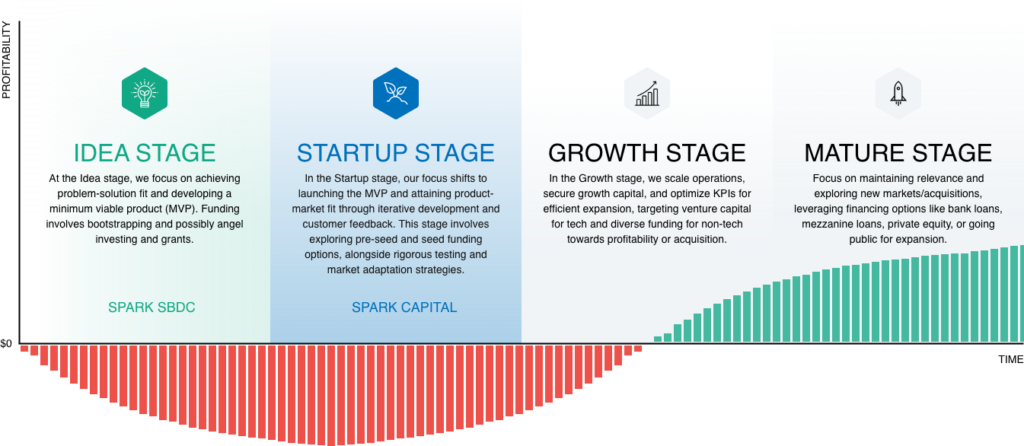
We Help Mature Stage Businesses Locate and Grow in the Ann Arbor Region
SPARK’s business development team helps companies find talent and office space, build and expand facilities, and leverage state and local incentive programs. In addition, SPARK’s entrepreneurial services team can help you plug into Ann Arbor’s startup ecosystem to find technology and talent to help your business grow.
For aspiring younger companies, Ann Arbor SPARK can guide you through refining your idea, launching a business, and reaching the mature stage. The entrepreneurial services team has multiple programs and resources to help you get started, as well as affordable office space.

Mature Stage: Scaling Into Larger Companies
Mature stage companies have successfully navigated the idea, startup, and growth stages of their lifecycle.
They often started out by taking a new product to market, achieving product-market fit and business model fit, then scaled into a larger company with many employees, dedicated functions and departments, consistent processes, and predictable cash flow and profit.
Their original market has matured and may have more competitors, slowing continued growth. The goal of this stage is to stay relevant, expand your existing market, and find new ways to grow. New growth often comes from acquisitions of other companies and launching new products and services targeting new markets.
Company Lifecycle and Funding Sources

Please Note: The company lifecycle graphic is a simplification of capital markets and may not apply perfectly to each company or industry. For example, most angel and venture investors only invest in technology companies, not traditional businesses like restaurants, retail, or real estate.
Mature Stage Funding
Operating a large and growing company requires a lot of capital. Fortunately, healthy companies at this stage have numerous options:
Banks love the predictable cash flow and assets of mature-stage companies. Banks lend for a variety of uses including working capital, real estate, equipment purchases, and market expansion, and usually at very competitive rates.
Unsecured (meaning no collateral) loans used for growth, based exclusively on the cash flow of the business, with interest rates ranging from 12 – 20 percent and equity ‘kickers’ usually in the form of warrants. While more expensive than traditional bank loans, mezzanine funding is cheaper than equity and less dilutive to business owners. Mezzanine lenders typically lend to mature businesses with a minimum EBITDA of $3 – 5 million.
Institutional investors that typically invest in larger, mature companies often take a majority stake (buyout) and work actively within the company to increase profitable growth. They then seek to exit within a few years at an above-market return. Institutional investors typically invest in more traditional industries but sometimes invest in larger tech companies as well.
Going through an IPO and listing your company on a public market, like the Nasdaq or NYSE, allows you to raise money through a stock (equity) or bond (debt) offering to the public, with the ability to raise significant capital and provide liquidity to investors. Most companies that list on the exchanges are larger, more mature companies, but there are smaller and mid-sized companies as well, and even startups, particularly in the life sciences, that are sometimes able to raise money through a public offering. For some entrepreneurs, this is the dream and culmination of a long journey.
Thriving and Growing in Ann Arbor, Michigan

Michigan, and specifically the Ann Arbor region, is a great place for mature companies to thrive and grow. Among other U.S. regions, it is considered one of the best places to live, do business, and find talent — and do so affordably. Ann Arbor is home to the University of Michigan, the leading public research institution in the world. This contributes significantly to the region’s status as one of the most rapidly growing technology hubs in the country.
Share Your Business Idea
It all starts with an idea. Become a SPARK client to access grants, work with mentors, and more.
Contact the Capital Programs Team
Connect with the experts to learn more about raising capital or if you’re interested in supporting startups by becoming an angel investor.